- Home
- Ron Chernow
Titan Page 5
Titan Read online
Page 5
It is hard not to be stirred by Eliza’s uncomplaining bravery in steadily tending five children in the face of her husband’s erratic, irresponsible ways. When Bill was on the road, she never knew where he was, what he was doing, or when he might surface again. Though she had Hiram Odell, and her father lived just across Owasco Lake, Eliza was often alone with the children at night in a town on the fringe of a wilderness. As she thumbed her Bible and puffed on a corncob pipe, she must have worried about roving thieves. One of Rockefeller’s favorite stories reveals her coolheaded response to danger:
Mother had whooping cough and was staying in her room so that we should not catch it. When she heard thieves trying to get at the back of the house and remembered that there was no man to protect us, she softly opened the window and began to sing some old Negro melody, just as if the family were up and about. The robbers turned away from the house, crossed the road to the carriage house, stole a set of harness and went down the hill to their boat at the shore.18
From such early experiences, John D. took away a deep, abiding respect for women; unlike other moguls of the Gilded Age, he never saw them in purely ornamental terms.
Born in 1813, Eliza had grown up in the shadow of the Second Great Awakening and was never lax about discipline. While Devil Bill dispensed gifts to the children, Eliza, by default, meted out punishment and tried to subdue the wild Rockefeller streak in her children. A kindred spirit, John accepted her stern country justice when she drew out the birch switch, strapped him to the apple tree, and “laid on Macduff,” as she styled it. “On those occasions I made my protests, which she heard sympathetically and accepted sweetly—but [she] still laid on, explaining that I had earned the punishment and must have it,” Rockefeller recalled. “She would say, ‘I’m doing this in love.’ ”19 She typically erred on the side of severity. Once, while punishing John for misbehavior at school, he started to plead his innocence. “Never mind,” she interrupted, “we have started in on this whipping, and it will do for the next time.”20 Rockefeller told a tale of his adolescence that highlighted his mother’s grim discipline. They then lived in Owego, and she had forbidden him to ice-skate on the Susquehanna River, but the lure of a moonlit night overwhelmed the better judgment of John and his brother William. They were gliding along the river when they heard the desperate cries of a young boy who had fallen through the ice. Pushing a pole to the flailing boy, John and William fished him from the water and saved his life. When they returned home, Eliza hailed their courage, then promptly got down to business. “We thought we should be left off without punishment,” said Rockefeller, “but mother gave us a good tanning, nevertheless.”21
Where William and Frank had their father’s broad face and high forehead, John had Eliza’s narrow face, piercing eyes, and sharp chin and a personality that conformed more to the Davison pattern. He also had his mother’s slow metabolism and ability to bear a large burden for long periods in an unruffled way. Many neighbors testified that the unflappable Eliza never lost her temper, never raised her voice, never scolded anyone—a style of understated authority that John inherited. From his mother he learned economy, order, thrift, and other bourgeois virtues that figured so largely in his success at Standard Oil. Forced to pay a heavy penalty for her impetuous decision to marry Devil Bill, Eliza trained her children to reflect coolly before making decisions; her frequent admonition “We will let it simmer” was a saying John employed throughout his business career.
For a woman of Eliza’s intense pride and religiosity, it must have been hard to endure the unaccountable absences of her gallivanting husband, and she drew closer, of necessity, to her oldest son, who struck her as precocious and prematurely wise. She saw qualities in him still invisible to the world at large. Because she confided in him and gave him adult responsibilities, he matured rapidly and acquired unusual confidence; it must have flattered his pride that he served as a surrogate father and was so vital to the family’s survival. His relations with his siblings seemed more paternal than fraternal, and he often instructed them. As he put it, “I know that in my own case I have been greatly helped by the confidence imposed in me since early boyhood.”22 Of course, this boyhood responsibility took its toll on John D., who experienced little of the spontaneous joy or levity of youth. Growing up as a miniature adult, burdened with duties, he developed an exaggerated sense of responsibility that would be evident throughout his life. He learned to see himself as a reluctant savior, taking charge of troubled situations that needed to be remedied.
Until he came to appraise him through more mature eyes, John idolized his father. A man capable of Paul Bunyan–esque feats, William Avery Rockefeller possessed the dash and virility that every young boy dreams of in a father. “I come of a strong family, men of unusual strength, a family of giants,” Rockefeller stated later in life.23 “What a bright smile my father had. Everybody liked him. ‘Uncle Billy,’ they called him.”24 By all accounts, Bill was a man of abundant talents. He was such a superb athlete that he could stand beside a fence and jump over it backward; such an amazing ventriloquist that he could create half a dozen characters talking at once; such a legendary animal trainer that he once taught tricks to a pet bear he had won in a shooting competition; and such a skillful hypnotist that he was darkly rumored to “throw a mist” around person and beast alike.25
If the children associated Eliza with discipline, they identified Bill with laughter, plenty, and good times. He was the ideal hunting and fishing buddy, a crack shot who could bring down small birds in flight. Mesmerized by guns, he kept a splendid set of clean, well-oiled rifles (including one with a telescopic sight) in the Moravia house. Taking aim at a pine tree while standing in a meadow, he would toss off rapid shots until the bark was shredded by bullets. When selling patent medicines, his marksmanship served him extremely well, for he would use it to draw a crowd in strange towns. Setting up a manikin with a clay pipe in its mouth, he retreated to a distance of two hundred paces, shot the pipe to smithereens, then offered a ten-dollar bill to anybody in the crowd who could match his prowess.
Lively and fun-loving, Bill created infectious merriment wherever he went. As his son noted, “He always wanted something going on in the house, singing or music of some sort.”26 He was nothing if not shrewd and used his talents to further his enjoyment. One day, he heard of a violin virtuoso who had been clapped in the town jail for drunkenness. The offender was given a choice: Either he could pay a hundred-dollar fine or serve a hundred days in jail, with each day served reducing the fine by a dollar. Unable to muster the hundred dollars, Bill let the musician stew for thirty-five days, then bailed him out for sixty-five dollars, taking his violin in exchange. For decades, Bill cherished this rich-toned, concert-quality instrument, which he would bow at waist level, like a country fiddler. It was undoubtedly from the Rockefeller side of the family that John inherited his lasting love of music.
With Owasco Lake always shimmering through the window, many of John D.’s dearest memories of Moravia centered upon fishing with Bill, who was prone to do outrageous things in the boat. During one lake outing, the middle brother, William, then a fat little boy unable to swim, made the mistake of grumbling about the heat. “Then cool off,” said his father, who plucked up the flabbergasted boy by the waistband and pitched him headlong into the water. When William sank straight to the bottom, Big Bill dived overboard, retrieved him, then tried to teach him to swim. As John said of the incident, looking on the bright side, “He was always training us to meet responsibilities and take care of ourselves.” 27
It would be wrong (if highly tempting) to see William Avery Rockefeller as simply some blithe, hedonistic spirit, for he was moralistic in his own way. He was a militant temperance advocate—alcohol having ruined his father, Godfrey—and he fiercely reproached John and William when he caught them smoking in the barn. “When, after my brother had reached the age of 40 years my father learned that he smoked, tears came into his eyes,” said John, who liked to focus on h
is father’s virtuous side as a convenient way to sidestep his vices.28
In no area did Bill impress his eldest son more—or did his eldest son prove more impressionable—than in the magical realm of money. Big Bill had an almost sensual love of cash and enjoyed flashing plump rolls of bills. “John D. Rockefeller inherited his shrewdness and love of money from his father,” remarked one of Bill’s companions. “The old man had a passion for money that amounted almost to a craze. I never met a man who had such a love of money.”29 Exhibiting a small-town, populist mistrust of banks—a mistrust he would pass along to John, who later kept Standard Oil free from the talons of Wall Street financiers—Bill stashed away his money at home. As one neighbor recalled, “He had money, lots of it. He kept it in a bureau drawer. There I’ve seen it, ones, twos, threes (we had three-dollar bills then), fives, tens, twenties, and fifties, all corded like wood and the bundles tied with twine, the stacks filling the drawer.”30 According to legend, he also had a four-gallon pail brimming with gold pieces, though it probably concealed base metal beneath the glittering surface. Once, at a family gathering, Bill disappeared for a time, then suddenly burst forth from his room with a patchwork tablecloth crafted from banknotes of varying denominations. This was part of his obsessive need to project a big-shot image to conceal the pettiness of his accomplishments. Neither as a boy nor a man did John find anything pathological about his father’s money madness, suggesting that he shared the same blind spot. After he had made his gargantuan fortune, he said admiringly of his father, “He made a practice of never carrying less than $1,000, and he kept it in his pocket. He was able to take care of himself, and was not afraid to carry his money.”31
The bane of John’s boyhood wasn’t poverty so much as chronic worry about money, and it is easy to see how cash came to seem like God’s bounty, the blessed stuff that relieved all of life’s cares. After the family spent anxious weeks or months running up credit bills and waiting for Father’s return, Bill would abruptly materialize, a jolly Santa Claus, swimming in lucre. He would compensate for his long absence by extravagant shows of generosity with his children. For John, money became associated with these brief but pleasurable interludes when the mercurial father was at home and the Rockefellers functioned as a true family.
During the early Moravia years, Big Bill began to train his eldest son in business matters, dispatching him at age eight or nine to evaluate and buy cord-wood for the house. “I knew what a cord of good solid beech and maple wood was,” said Rockefeller. “My father told me to select only the solid wood and the straight wood and not to put any limbs in it or any punky wood.”32 Of all the lessons John absorbed from his father, perhaps none surpassed in importance that of keeping meticulous accounts. This was a matter of necessity, for Bill’s wayward life forced his family to husband their credit and closely monitor their often precarious financial situation.
When it came to business ethics, Bill was a most curious compound, extremely honorable one moment, a sharpster the next. To his son, he tacitly conveyed the message that commerce was a tough, competitive struggle and that you were entitled to outwit the other fellow by any means, fair or foul. He tutored John in a sharp, relentless bargaining style that the latter made famous. (A most unorthodox bargainer, Bill once bid a thousand dollars less for a farm than the owner was asking; to settle matters, he suggested they shoot at a target. Bill won and got his thousand-dollar discount.) As a traveling mountebank, selling dubious cures to credulous rural folk, Bill took a dim view of people’s intelligence and didn’t hesitate to exploit their naive trust.
As a boss, Bill patented his own queer style of managing people. During his respectable time in the lumber business, he paid his men well and promptly and was said by his son to be very popular. Yet he had a habit of hiring workers for a spell, informing them politely, “I don’t need you any longer,” then hiring them again a few days later—what he proudly dubbed his “policy of firing and hiring over.” If this made him sound like a less-than-lovable boss, his son applauded the unsettling tactic. “It kept the men up on tip-toe; no stagnation among them.” 33 Oddly enough, John described his father as “most liberal and kindly with his employees, yet eminently practical and keen and wide-awake and resourceful.”34 This was one of many areas where he seemed to embroider the truth about Big Bill. Would the people he fired and hired again have described Bill as “liberal and kindly”?
John D. Rockefeller portrayed his father as a paragon of business virtue, and if this was mostly an effort to cover up the shady side of Bill’s life, it had a grain of truth. Bill paid his debts punctually and believed implicitly in the sacredness of contracts, taking great pains in writing them up. As John observed, “He was very scrupulous to carry out his contracts, particular[ly] that they were clearly understood and carefully drawn, that is, committed to writing. And the training he gave me along those lines was very valuable, has proven so in all my life.” 35 In his business career, John D. Rockefeller was accused of many sins, but he took pride in paying his debts promptly and abiding strictly by contracts. He was also accused of mixing the lawless and the honorable, of ignoring ethical niceties, in a manner reminiscent of his father.
Whether John D. Rockefeller ultimately followed his father’s unscrupulous craft or his mother’s stern respectability in steering Standard Oil is the question that weighs most heavily on his historical reputation. Bertrand Russell once said of Rockefeller, “What he said, what he thought, and what he felt, came from his mother, but what he did came from his father, with the addition of a great caution generated by early unpleasantness.” 36 The issue is much more complicated than that, but there’s no doubt that Rockefeller’s achievement arose from the often tense interplay between the two opposing, deeply ingrained tendencies of his nature—his father’s daring and his mother’s prudence—yoked together under great pressure.
Given the paucity of hard evidence about Bill’s affairs in Moravia, one is led to rake over the rich folklore he left behind. In 1927, a carpenter turned author named Charles Brutcher published a book entitled Joshua: A Man of the Finger Lakes Region, a thinly disguised roman à clef about William Avery Rockefeller. The privately printed 130-page book has become something of a collector’s item, with copies sometimes fetching hundreds of dollars. The protagonist is one William Rockwell, a.k.a. Big Bill, and the author brazenly mingles fact and fiction by reproducing an actual photo of Rockefeller’s father in the front. Joshua professes, redundantly, to be a “true story taken from life” and gathers lore about Devil Bill that was still titillating the town gossips in the 1920s. Much of its store of legend came from Melvin Rosekrans, whose father, Joshua, had locked horns with Big Bill in the 1840s. The book presents a slanted, hyperbolic portrait of Bill’s career, a compendium of his presumed misdeeds, yet enough details tally with documentary material from other sources that it merits review.
According to this potboiler, the “masterful and self-confident” Big Bill became “the terror of the Finger Lakes region,” whose “evil influence would be felt in every household for miles around.” Eliza makes a cameo appearance as “a sad-faced little woman” kept ignorant of the true reasons for her husband’s mysterious trips: “She was always opposed to ‘Big Bill’s’ roving disposition and his evil minded tendencies.” 37 If she suspected wrongdoing, she kept it to herself to spare the children. That the fictional Eliza earned the sympathy of the community jibes with what we know of the real Eliza’s Moravia life.
The book narrates how Rockwell fell in with a bunch of desperadoes who stole horses and delivered them to the notorious Loomis Brothers gang. (This grave, unsubstantiated charge shadowed Bill in all three New York towns he lived in.) Another equally grave charge in the book concerns Dr. William Cooper, a cousin of the novelist James Fenimore Cooper. Dr. Cooper disliked Bill and refused to deal with him. The book asserts that Rockwell once coerced at gunpoint a reluctant Dr. Cooper to treat Eliza and that somebody afterward took potshots at the doctor through the blinds o
f his living-room window, narrowly missing him. Rockwell is further portrayed as an unconscionable philanderer, who lures pretty girls with a secret love potion and tries to seduce a young woman working in his house. He openly squires his girlfriends around Moravia in his carriage and takes them rowing on the lake, notwithstanding Eliza’s dismay. “The poor, long suffering little woman knew the failings of her dashing mate. She was overpowered by his master mind and had long since become resigned to her fate.” 38 The diabolical Bill is even accused of palming off counterfeit bills.
At first, the locals were so petrified of the rough-and-tumble Rockwell that they didn’t dare to confront him. Yet Joshua ends as a tale of justice triumphant as Bill’s gang is disbanded by an irate citizenry. In a climactic courtroom scene, it is proved that Rockwell had paid a black man ten dollars to steal rafting chains in order to smuggle logs across Owasco Lake. His luck having run out, Bill flees the courtroom, though another gang member serves time in Auburn prison for horse theft. When last seen in the book, Big Bill has shifted operations to Owego, where horses again begin to disappear suspiciously. In a shameless bit of press agentry that Bill himself would have savored, Brutcher ends by promising a sequel, adding, “Negotiations are pending for the filming of this gripping story and its early appearance on the silver screen is assured.”39
In the early 1900s, when Ida Tarbell dispatched a research assistant to upstate New York, he picked up the same allegations of horse theft that flavor the pages of Joshua. Horses were said to have begun vanishing after Big Bill moved first to Richford and later to Moravia. “It became noised about the neighborhood that ‘Old Bill’s gang’ were the horse thieves,” reported Tarbell’s assistant.40 In 1850, three of Bill’s cronies—Caleb Palmer, Charles Tidd, and a man named Bates—were arrested for stealing mares. After Tidd turned state’s evidence, he provided the testimony that was used to incarcerate Palmer and Bates. It must be stressed that no court records actually connect Bill with the crime and that biographer Allan Nevins, after much examination, branded the horse-thieving charges “ridiculous.” 41 Yet the anecdotal evidence can’t be so easily dismissed. Tarbell’s assistant noted, “Everyone I talked with in Moravia declares that ‘Old Bill’ was the head of the gang.” John Monroe Palmer, son of one of the jailed culprits, fingered Bill as the mastermind of the “underground horse railroad.” “Rockefeller was too smart to be caught,” he griped. “He ruined my father, and then left him in the lurch.” 42

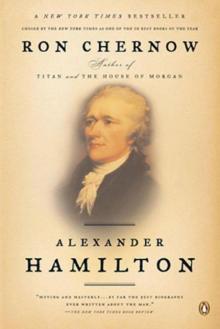 Alexander Hamilton
Alexander Hamilton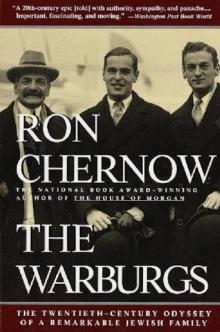 The Warburgs
The Warburgs Titan
Titan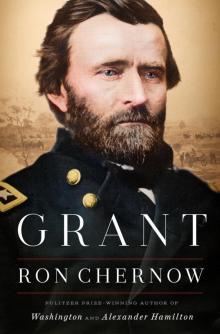 Grant
Grant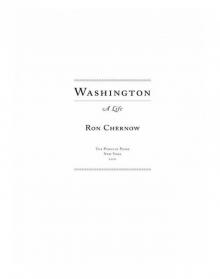 Washington
Washington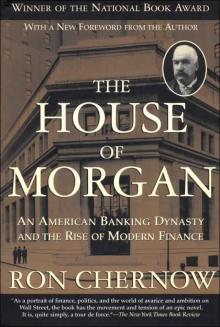 The House of Morgan
The House of Morgan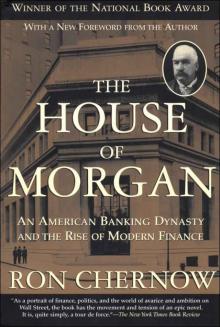 The House of Morgan: An American Banking Dynasty and the Rise of Modern Finance
The House of Morgan: An American Banking Dynasty and the Rise of Modern Finance